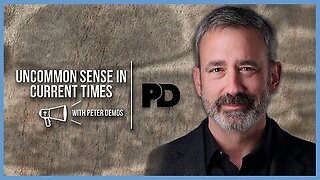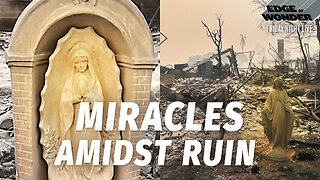Premium Only Content

Episode 1082: Catholics understanding the Bible during Lent
Key idea 1
Genesis and the Start of Everything
The best place to start the Bible is – funnily enough – at the beginning: Genesis and the six days of creation.
The first few chapters shouldn't be seen as an attempt to answer any questions about life – rather, Genesis serves to reveal God and his mercy. There are some who believe that the Lord created the earth in six literal days, while others suggest that each "day" was a prolonged period lasting tens of thousands of years. This is unclear, and beside the point. What is clear is that this wasn’t an accident – God is the creator.
And he knew what he was doing. When God created Adam and Eve, their inevitable sin was no surprise. In fact, his plan accounted for it. He tells them in Gen 2:17 that “in the day that you eat” of the tree of knowledge, they’ll surely die. He speaks of when not if. He knew it was going to happen!
And in this, you can see God's mercy. He lets Adam and Eve live despite saying that they’ll die if they eat the fruit. Even in their sin, he follows them out of his love for mankind and shows both mercy and discipline.
His mercy and love for humanity are seen again when he sends the flood to wipe out the corrupted bloodline of Adam. He forms a covenant with Noah, instructing him to build the arc and save himself and his family.
It’s Noah’s family – eight individuals in total – that God commands to multiply and fill the earth. This starts the line of descendants up to when he sends the Messiah, about 2,000 years later.
So, what can we take from these first few chapters that make up the book of Genesis? As Adam and Eve ran from him, God pursued them; but it wasn’t to punish them. Instead, he sought them out to clothe them. When mankind fell, he still loved us. And he continues to love us.
All of this shows God's absolute love and dedication for humanity and the fact that he had a plan from the start.
Key idea 2 The Trials of Job
Have you ever felt like the world is out to get you? That nothing’s going right? That forces out of your control keep bringing you down and making your life a misery? It's in those dark times that you should dig into the book of Job.
Job comes along about 400 years after the great flood, and things don’t seem to be going too well for him. A blameless, good, and God-fearing man, Job finds himself at the center of a conversation between God and Satan. Satan wants to test Job – killing his servants, destroying his livestock, and plaguing him with horrible sores.
It’s interesting to note that Satan doesn't have the power to do this on his own, but God allows it – on the condition that Satan isn’t allowed to kill Job.
But does Job then turn from God? No. Through all this Job continues to praise him. Throughout the chapters, Job’s friends talk to him, insisting that he must deserve this.
But his friends are wrong. Your degree of suffering isn’t related to what you “deserve.” If it were, it must be the rich and healthy that are righteous, and the poor family which loses its home to a hurricane must be sinners, right? Well no, God doesn’t work like that.
And Job knows it. Sure, he accepts that God has some agency in what’s happening. He is God, after all. Nothing happens without his permission. But through all it all, Job acknowledges that he doesn’t – and can not – fully understand God's plan. He must be patient and suffer.
In the final chapters, God finally speaks to Job and his friends. He chastises them for the assumptions that they made and for the righteousness with which they spoke. But, in his mercy, he forgives them all. And in a final act of love, he restores all that was taken from Job – his friends, his livestock, and his reputation.
So in the end, the book of Job is about patience, perseverance, and faith.
If you find yourself in a dark place, don’t give up. God is your hope and your light, and it’s in those dark times that you should look for him more than ever.
Key idea 3 The Wisdom of Ecclesiastes
Imagine you had the time and resources to live however you want. How would you go about living your most joyful life? This is exactly what the preacher – most likely Solomon – sets out to discover in the book of Ecclesiastes.
He starts by throwing himself into work. But where does this lead? Great buildings eventually fall down, technology becomes obsolete, and any money earned gets reduced through taxes. Despite working hard, the preacher discovers that he still feels empty – possibly even more so than before!
So how about fun and pleasure? Surely that leads to a joyful life. But alas, he soon finds that any joy from parties, music, and concubines is fleeting and unsatisfying. Any enjoyment or knowledge he gets from this is undercut by the fact that he’s still going to die.
The wise man and the fool both die in the end and any possessions left behind end up with someone else. So what's the point?
This is when the preacher decides to start living in the moment and working for the Lord. He notes that life is divided into pairs of seasons: “A time to be born” and “a time to die.” “A time to mourn” and “a time to dance.” Life is complex and contradictory – but God is working throughout all of it. Everything that exists and happens is by his will and even the wisest man is unable to grasp it all.
This unknown element reminds us that we aren't God, so we must trust to him the things that we don't know. So, what conclusion does the preacher take from all this?
Verse seven says: "The dust returns to the earth as it was, and the spirit returns to God who gave it."
At the end of the day our lives will always be full of pain and joy but what’s important is that we walk with and obey God – no matter what.
Key idea 4 The Start of the New Testament and the Coming of Jesus
After the end of the Old Testament, there’s a period known as the 400 years of silence. There’s no recorded word or sign from God. But mankind is quite busy. The Jewish people, having been driven out by the Babylonians, are taken over first by the Persian Empire and then by the Roman Empire.
The Jewish people are tired; exiles and slaves in their own land, oppressed by one of the cruelest empires ever seen. Put simply, they’re ready for a savior.
The story of Jesus Christ is told through the different lenses of four often overlapping Gospels. Luke's lens is mainly Jesus as man, John's is Jesus as God, Matthew's is Jesus as king, and Mark's is Jesus as servant. These may seem contradictory – God and man? King and servant? But these juxtapositions work to provide a clearer picture of the son of God.
When performing his miracles, Jesus seeks out the unwanted and unloved – those rejected by rabbis and hated by the locals. He’s there to free the oppressed and imprisoned, bring sight to the blind, and good news to the poor. This exemplifies the true extent of God's love.
In Jesus's famous sermon on the mount, he says that we’re spiritually poor. When we realize this, we become meek, or susceptible to influence. This meekness creates in us a desire for God to make us more righteous. And because we know what it's like to struggle, we can more easily show mercy to others.
But we shouldn't just turn Jesus's messages and blessings into a checklist, a series of things we need to do to get into heaven. We can't just be right in our actions, we must also be right in our hearts. We have to be perfect, just as the Lord is perfect.
This, of course, is impossible. It’s only through Jesus's sacrifice – his perfect life and perfect death – that Christians believe they can ultimately achieve that righteousness.
Key idea 5 Betrayal at the Last Supper
At the last supper, Jesus announces to his 12 disciples that he’ll be betrayed by one among them. When all his friends but one call him Lord, Jesus affirms who it is. Judas has sold Jesus to the Romans for 30 silver pieces.
A detail about the last supper is only mentioned in the Gospel of John – Jesus washes his disciples' feet. This is usually the job of a slave or a servant, but Jesus does it anyway.
Notably, Jesus doesn't try to overpower or stop Judas when he has the chance. He knows the plan of the Father. He knows the role that evil plays in it. He serves Judas along with everyone else.
With the Roman authorities on their way to arrest him, Jesus gives his disciples some commands: he tells them to love each other as he has loved them. Then he tells them to get a sword. While this might initially seem like a final plan to overthrow Rome, it’s not the case.
There are three things Jesus could have meant by this. First, the sword could refer to spiritual readiness. Alternatively, he could have been preparing his followers to physically defend themselves from the coming attackers. The third possibility is that he knew that the Romans would need a legal cause and holding weapons would give the authorities the proof they needed to arrest him.
When the authorities finally come with their torches, Peter, in an act of defense, uses his sword to cut off a soldier's ear. But Jesus stops him and heals the very soldier who has come to take him into custody.
All through this, Jesus emphasizes the joy and peace he has for us: “Let not your heart be troubled.” “… my joy may be in you, and your joy may be full.” “Your hearts will rejoice, and no one will take your joy from you.”
Jesus submits to his Father's plan with humility and love.
The blood of his sacrifice covers all who believe, bringing the peace and hope that was always promised!
Key idea 6 Revelation and the Beauty that Lies Ahead
The Bible ends with the words of John – likely the apostle – from a tiny prison on an island. After trying and failing to burn him alive, the Romans settled on just locking him away. And here he wrote a letter with the revelation of Jesus, in the form of a series of visions leading up to Jesus’s return.
Some of these visions are violent and frightening, but Jesus tells us to “fear not.” And why should a true believer be scared? If you trust and love Christ, then you know that you’ll be walking by his side in these final days.
Revelation is filled with numbers and symbols – 24 elders around God’s throne, seven seals on the scrolls, four horsemen on four horses – and it’s tempting to try to find hints as to when this second coming will happen. But remember that this is a revelation. If God wants to reveal something, he’s not going to try to hide it, is he?
Though by the nature of John’s vision, there’s still some symbolism. At one point there’s a seven-headed ten-horned sea beast that everyone loves. This likely represents Rome. At the time, Rome was the focus of religion for those who didn’t worship God.
The sea beast is defeated by the lamb – Jesus – who lays down his life for victory. When Jesus appears wearing a blood-dipped cloak upon a white horse, the sword coming out of his mouth represents the fact that his Word is his weapon.
Toward the end of the vision, and therefore the end of the Bible, heaven and Earth pass away, to be renewed. Through this renewal, the new Jerusalem will come – a giant jewel-encrusted gold cube, 1,400 miles each side.
There’ll be no temple because God is the temple. In this beautiful place, it’s always day, because God is light. The water of life flows. The Tree of Life grows all around. But unlike when Adam and Eve ate the tree’s fruit, it’s no longer forbidden. Anyone may eat from it as much as they like.
In the end, Jesus says that he’s coming back three times. This is a promise to all who believe.
As the final book of the Bible draws to a close, John responds to this promise: “Amen. Come, Lord Jesus!”
Final Summary
The Bible is a huge book that can be read over and over again for its countless lessons about life and the way of God. The parts covered in this Blink are just a small taste of what insights The Bible Recap has to offer.
By taking the Bible one bite-sized chunk at a time, it can be understood in its entirety – not just as a checklist of how to live a good life. And through this understanding, we can see the true character of God.
From the fall of Adam and Eve and the trials of Job to the sacrifice of Jesus Christ and the beautiful promise of Revelation, God’s love shines through everything, and to walk by his side is to never be alone.
-
 51:58
51:58
PMG
5 hours ago $0.04 earned"Can the Government Learn from Elon Musk’s 70% Labor Cut? A Deep Dive into Inefficient Agencies"
10.5K -
 LIVE
LIVE
Amish Zaku
5 hours agoRumble Spartans #10 - New Year New Maps
144 watching -
 1:04:58
1:04:58
In The Litter Box w/ Jewels & Catturd
1 day agoNo Tax On Tips! | In the Litter Box w/ Jewels & Catturd – Ep. 722 – 1/17/2025
136K31 -
 5:35:39
5:35:39
Dr Disrespect
11 hours ago🔴LIVE - DR DISRESPECT - WARZONE - CRAZY CHALLENGES
160K33 -
 1:16:30
1:16:30
Edge of Wonder
7 hours agoLA Fire Updates: Miracles Amidst the Devastation
35.3K8 -
 54:54
54:54
LFA TV
11 hours agoBanning Mystery of the Ages | TRUMPET DAILY 1.17.25 7pm
30.2K7 -
 1:47:13
1:47:13
2 MIKES LIVE
4 hours ago2 MIKES LIVE #168 Open Mike Friday!
26.6K2 -
 1:05:11
1:05:11
Sarah Westall
5 hours agoMysterious Fog and California Wildfires Both Contain Dangerous Elements w/ Dr Robert Young & Hazen
30.4K7 -
 1:40:48
1:40:48
Mally_Mouse
4 hours agoLet's Play!! -- Stardew Valley pt. 23!
26.8K -
 16:21
16:21
China Uncensored
8 hours agoCan Anything Stop the Tiktok Ban?
38.4K11